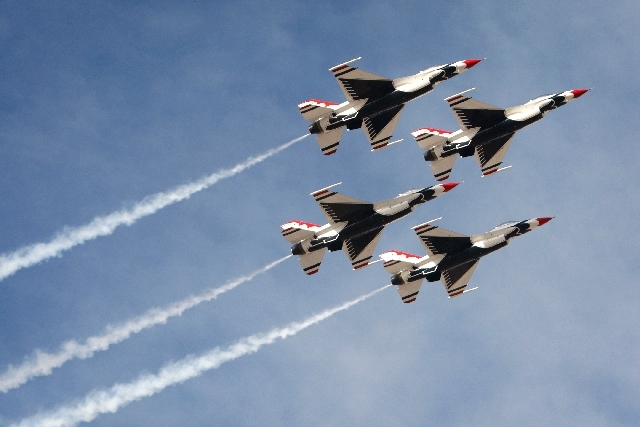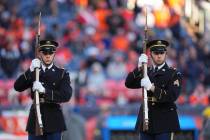U.S. Air Force combat aircraft, Thunderbirds no longer grounded
The U.S. Air Force said Monday many of its combat air forces would start flying again —as well as the Thunderbirds demonstration team at Nellis Air Force Base — after being grounded since April because of budget cuts.
Maj. Darrick Lee, a Thunderbirds’ spokesman, said the green light to resume flying doesn’t mean the team will finish out this year’s air show schedule, which had included performances at shows in Milwaukee and Chicago in August. The Aviation Nation air show and open house that had been scheduled for November at Nellis Air Force Base in Las Vegas also remains cancelled.
“The only thing this announcement does is it allows very limited hours for pilots and maintainers” to stay current in their training requirements, Lee said.
He said the team expects to be back in the air next week and is hopeful it can keep flying to meet proficiency requirements after the new fiscal year begins Oct. 1.
A story Monday posted on the Thunderbirds’ website, citing commander and leader Lt. Col. Greg Moseley, says the team will resume training flights “with the anticipation that it may be able to resume a limited number of aerial demonstrations next calendar year.”
The grounding affected about one-third of active-duty combat aircraft, including squadrons of fighters, bombers, and airborne warning and control craft.
Officials at Air Combat Command at Joint Base Langley-Eustis in Virginia said planes in the U.S., Europe and the Pacific would become airborne again starting Monday.
“Since April we’ve been in a precipitous decline with regard to combat readiness,” Gen. Mike Hostage, commander of the command, said in a statement. “Returning to flying is an important first step but what we have ahead of us is a measured climb to recovery.”
Describing the Thunderbirds as “the pride of Southern Nevada,” Rep. Dina Titus, D-Nev., said although she’s “pleased to hear they will be flying again,” the good news is only temporary.
“Without a solution to fix the sequester, the Thunderbirds will once again be grounded in October,” Titus said in a statement Monday.
In order to restore the Thunderbirds’ flying hours “for the long-term,” Titus said Congress must act to end the sequester “and enact a budget that protects programs like the Thunderbirds that contribute to our economic stability and national security.”
Sen. Jim Inhofe, R-Okla., ranking member of the Senate Armed Services Committee, offered a different perspective, saying the reprogramming of funds means the Air Force can also find a way to end furloughs in the 2014 fiscal year.
The announcement “proves the military’s pain from sequester could have been mitigated all along had my bill to give flexibility to the Department of Defense been rightfully considered,” Inhofe said in a statement Monday. “Instead, the president chose politics over the needs of our war fighters and issued a veto threat of my bill, focusing his effort on shirking responsibility rather than providing the budget flexibility his commanders have repeatedly requested.”
The Defense Department received authority from Congress to shift about $7.5 billion from lower priority accounts to more vital operations. The Air Force said the restored flying hours represent about $208 million of that allocation authorized by Congress.
The Associated Press contributed to this report.





























